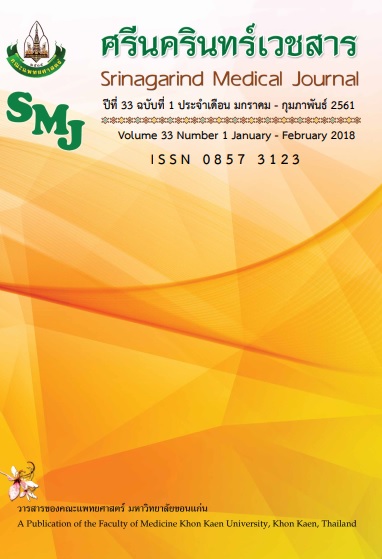The Pharmacology and Pharmacogeneticsof Imatinib in Chronic Myeloid LeukemiaTherapy
Keywords:
Imatinib; chronic myeloid leukemia; pharmacology; pharmacogenetics; ยา imatinib; โรคมะเร็งเม็ดเลือดขาวเรื้อรังชนิดมัยอีลอยด์เภสัชวิทยา; เภสัชพันธุศาสตร์Abstract
Imatinib, a tyrosine kinase inhibitor, is considered as the first line drug for treatment of chronic myeloid leukemia(CML). Imatinib is highly effective therapy for Philadelphia chromosome positive CML. However,a proportion of patients do not respond well to imatinib therapy. Several studies have attempted to identify genetic factors associated with imatinib responses in CML patients involving drug transporter and imatinib metabolizing enzyme genes such as ATP-binding cassette transporter subfamily B member 1 (ABCB1), ATP-binding cassette transporter subfamily G member 2 (ABCG2),organic cation transporters1(OCT1), and cytochrome P450 3A5 (CYP3A5). The effects of these genetic polymorphisms, however, are still controversial. This review focuses on gathering the knowledge about the pharmacology of imatinib including mechasnism of action, pharmacokinetics, drug interactions, adverse drug reactions, and mechanisms of imatinib resistance. Additionally, the pharmacogenetics studies of imatinib are also reviewed. This informationis useful for medical/professional staffs in improving the efficacy and safety of imatinib therapy.
เภสัชวิทยาและเภสัชพันธุศาสตร์ของยา imatinib ในการรักษาโรคมะเร็งเม็ดเลือดขาวเรื้อรังชนิดมัยอีลอยด์
นิตย์สุภา วัฒนชัย1,2
1ภาควิชาเภสัชวิทยา คณะแพทยศาสตร์ มหาวิทยาลัยขอนแก่น ขอนแก่น
2กลุ่มวิจัยไกลโคไซเอนซ์และไกลโคเทคโนโลยีคณะแพทยศาสตร์ มหาวิทยาลัยขอนแก่น ขอนแก่น
ยา imatinib เป็นยายับยั้งไทโรซีนไคเนส (tyrosine kinase inhibitor) โดยใช้เป็นยาหลักในการรักษาโรคมะเร็งเม็ดเลือดขาวเรื้อรังชนิดมัยอีลอยด์ (chronic myeloid leukemia; CML) ถึงแม้ยา imatinib มีประสิทธิภาพดีในการรักษา CML ที่มีการแสดงออกของโครโมโซมฟิลาเดลเฟีย อย่างไรก็ตามพบว่ามีผู้ป่วยไม่ตอบสนองต่อการรักษามีหลายการศึกษาที่แสดงถึงปัจจัยทางพันธุกรรมที่มีผลต่อการตอบสนองต่อยา imatinib ในผู้ป่วย CML ซึ่งเกี่ยวข้องกับยีนที่เป็นตัวขนส่งยาและเอนไซม์ที่เปลี่ยนแปลงยา imatinib ได้แก่ ภาวะพหุสัณฐานทางพันธุกรรมของยีน ATP-binding cassette transporter subfamily B member 1 (ABCB1), ยีน ATP-binding cassette transporter subfamily G member 2 (ABCG2), ยีน organic cation transporters 1 (OCT1) และ ยีน cytochrome P450 3A5 (CYP3A5) อย่างไรก็ตามผลของภาวะพหุสัณฐานทางพันธุกรรมของยีนดังกล่าวข้างต้นยังคงมีข้อขัดแย้ง ซึ่งในบทความนี้มุ่งเน้นประมวลองค์ความรู้ที่เกี่ยวข้องกับเภสัชวิทยาของยา imatinib ซึ่งได้แก่ กลไกการออกฤทธิ์ เภสัชจลนศาสตร์อันตรกิริยาระหว่างยา imatinib และยาอื่นที่ใช้ร่วม อาการไม่พึงประสงค์ และกลไกการดื้อยา imatinib นอกจากนี้ยังได้กล่าวถึงการศึกษาทางเภสัชพันธุศาสตร์ของยา imatinib ซึ่งข้อมูลดังกล่าวจะเป็นประโยชน์สำหรับบุคคลากรทางการแพทย์เพื่อให้การรักษาด้วยยา imatinib เกิดประสิทธิผลและความปลอดภัยมากยิ่งขึ้น




